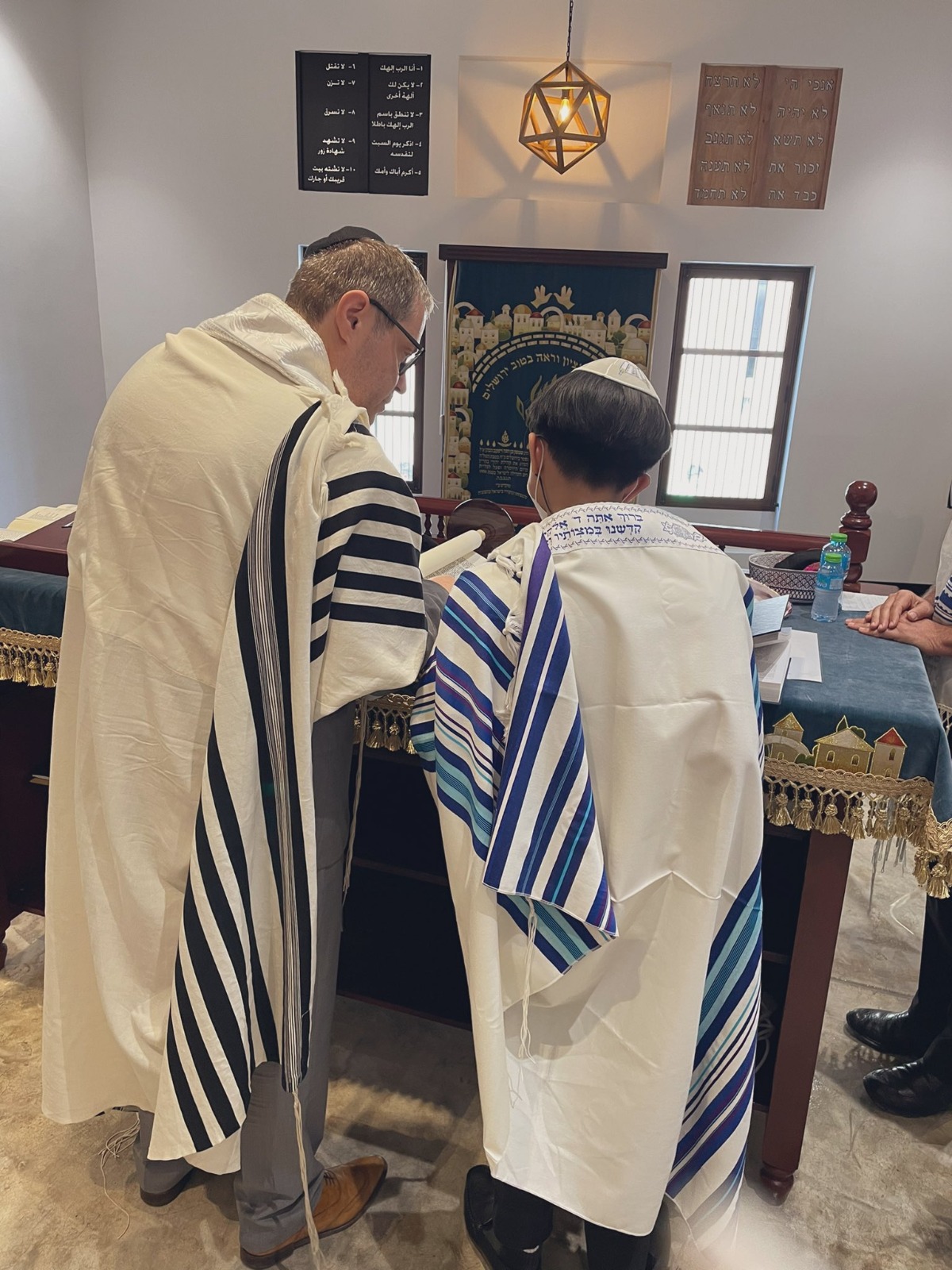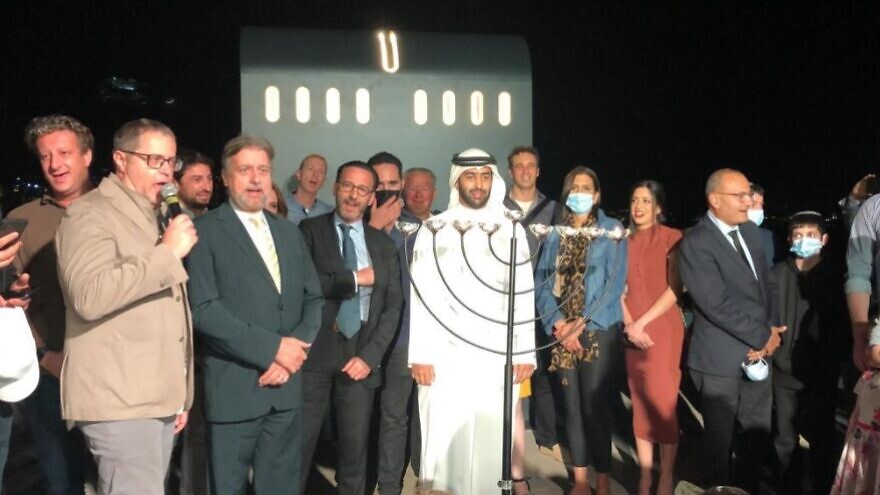When it comes to the impact of the Abraham Accords on Jewish life in the Persian Gulf, most thoughts turn to the opportunities for Israelis to flock to newly opened kosher hotels and restaurants in Dubai or Manama, or to visit the remnants of a once-thriving Jewish community in Bahrain, the origins of which are thought to go back to late antiquity.
But on the one-year anniversary of the formation of the Association of Gulf Jewish Communities (AGJC), the focus has turned to the future of a more permanent Jewish life in the region.
Nonoo is chairman of the Board of Trustees of the House of Ten Commandments, the Jewish community in Bahrain, and whose family’s presence in Bahrain dates to the late 1800s when a group of Iraqi Jews arrived in search of better work and lifestyles. The AGJC aims to serve Jews in the Gulf Cooperation Council (GCC) countries, including the United Arab Emirates and Bahrain, which are the main Jewish population centers of the region, along with much smaller communities in Oman, Qatar, Saudi Arabia and Kuwait, many of which are affiliated with the U.S. military or business opportunities overseas, or are citizens quietly practicing under restrictive government conditions.
Nonoo, whose synagogue is the only properly functioning one in the region, said the changes over the last year include regular Saturday-morning services, even when it lacks a minyan.

If they do get a minyan, he says, “we can bring the Torah out, and if there’s any special occasion, we could always bring the rabbi from Dubai. And we have our, rabbi, Elie Abadie, here. And we have a chazzan from Dubai as well. We’ve had a bar mitzvah are already in Bahrain, and we had a wedding. So Jewish life is flourishing from that point of view, and our next step is to be able to have a beit din [rabbinical court] set up in Bahrain be part of the AGJC,” said Nonoo, adding that another priority is to make sure that the region’s Jews have whatever they need to participate in festivals throughout the year.
“Since 1948, the community itself practiced their faith at home. So, we did all our festivals at home,” explained Nonoo. “We never had matzah, so the local Jewish women used to bake their own unleavened bread, which some of them still do. We used to make do with all the kosher food being cooked at home. And we had the books, so we knew part of the prayers to do because my father knew how to pray in Hebrew. He taught us a little bit, and the rest of the community did the same.”
Now, he continued, “the big difference is that we can actually use the synagogue, and we can actually feel comfortable about seeing our relatives come back from Israel because a lot of our relatives who left and went to Israel couldn’t come back to Bahrain.”
The AGJC is effectively serving as an umbrella support organization for a loose string of communities. As Jewish life has expanded in the region recently, there have been some rifts caused by new rabbis coming in, including one who dubbed himself the chief rabbi of Saudi Arabia—much to the reported consternation of the small Jewish community there, which much still pray behind closed doors.
Nonoo emphasized that “we just want to be there for whoever needs us, basically. And that’s the way we’re going forward.
Invigorating available Jewish amenities—from services to singles
Rabbi Dr. Elie Abadie serves as the AGJC’s rabbi, after joining the Jewish Council of the Emirates (JCE) in 2020 as its senior and resident rabbi. He told JNS that the Conference of European Rabbis, the Jewish Agency for Israel and the Jewish Federations of North America are among the organizations that have lent support to his expansion efforts.
“We have been able to reach out to individual Jews living in Saudi Arabia, Oman, Qatar, Kuwait. These Jews have been living a quiet life under the radar until now. We’ve provided them with matzah, with shofars, with the reading of mitzvot. We have revived the practice of Jewish individuals and Jewish communities in the entire Gulf,” said Abadie, who oversees the recently established Arabian Kosher Certification Agency, which aims to set the same kosher standards throughout all six GCC countries, making it easier for practicing Jews to live in or travel around the Gulf.

Abadie is also leading the development of the Beth Din of Arabia to assist with issues pertaining to personal status and voluntary business dispute resolutions. The AGJC’s weekly pre-Shabbat Zoom, created by the JCE, has brought the Jewish communities of the Gulf together during the coronavirus pandemic with weekly Torah portion readings, lessons and opportunities to hear from prominent cultural and religious leaders in the Gulf, Israel and the Jewish Diaspora.
Nonoo noted two main obstacles to a more rapid expansion of Jewish life in the Gulf over the last year. One, of course, is COVID-19, which he said dampened the relocation plans of those who wanted to relocate. The second is the requirement among several GCC countries in securing work visas through verified employment prior to moving.
“You need to have a solid job to move to the Gulf, but what’s changed now is that if a family is looking to relocate, they’re going to feel comfortable because they’ve got all the surrounding Jewish life around them,” he said. “Now, that’s not to say that jobs are easy to get in the Gulf, but I’ve got to tell you that Bahrain is becoming a very interesting location for people looking to relocate. We’re seeing some families come into Bahrain, which is great, but not on the scale that perhaps Dubai is seeing. I don’t really have numbers, but Dubai is seeing a lot more of the Jewish community finding jobs there.”
Of course, the expansion of Jewish life means that extra consideration must be given to the development of families, including starting them. That led to the launch of the Jewish Singles in the Gulf (JSG) website, which aims to serve as the shidduch, “or matchmaker,” for the region’s Jews.
Ariella Steinreich, a founding member of the UAE-Israel Business Council and of the Gulf-Israel Women’s Forum and an active member of the AGJC who also works on its public-relations efforts, said initiatives like JSG are critical for the future of the Jewish Gulf.
“The thinking is that many came here for work, but if they find a spouse out here, and then they settle down and have kids, we will naturally need to create more Jewish schools, more kosher food, more infrastructure. So, it’s actually all part of this kind of grand story of where Jewish life here is heading, and we’re really creating our own community out of the people who are already here.”
She pointed out that the dating website “is not just for people who are here, but people who maybe want to be out here. We have people from Europe, from Israel, who are all open to relocating to the Gulf, and now they have access to meet people that they wouldn’t have met before.”


























